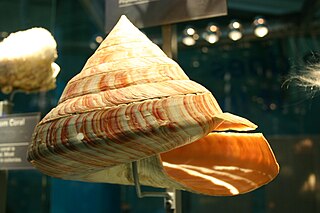This glossary of ichthyology is a list of definitions of terms and concepts used in ichthyology, the study of fishes.

Fiona pinnata, common name Fiona, is a species of small pelagic nudibranch, a marine gastropod mollusk in the superfamily Fionoidea. This nudibranch species lives worldwide on floating objects on seas, and feeds mainly on barnacles, specifically goose barnacles in the genus Lepas.

Nembrotha lineolata is a species of nudibranch, a sea slug, a marine gastropod mollusk in the family Polyceridae. It is found in shallow water in the Indo-Pacific. It was first described in 1905 by the Danish malacologist Rudolph Bergh. The type locality is Selayar Island, Indonesia.

Pleurotomariidae, common name the "slit snails", is a family of large marine gastropods in the superfamily Pleurotomarioidea of the subclass Vetigastropoda. This family is a very ancient lineage; there were numerous species in the geological past. The genus includes several hundred fossil forms, mostly Paleozoic. It is one of the oldest gastropod families, commencing in the Cambrian.
Geomalacus malagensis is a species of air-breathing land slug, a terrestrial pulmonate gastropod mollusc in the family Arionidae, the round back slugs.

Tritonicula bayeri is a species of dendronotid nudibranch. It is a marine gastropod mollusc in the family Tritoniidae. A number of Caribbean and western Pacific species of Tritonia were moved to a new genus Tritonicula in 2020 as a result of an integrative taxonomic study of the family Tritoniidae.

Tritonicula hamnerorum is a species of dendronotid nudibranch. It is a marine gastropod mollusc in the family Tritoniidae. A number of Caribbean species of Tritonia were moved to a new genus Tritonicula in 2020 as a result of an integrative taxonomic study of the family Tritoniidae.

Oxynoe viridis is a species of small sea snail or sea slug, a bubble snail, a marine gastropod mollusk in the family Oxynoidae.

Deuterocopus atrapex is a moth of the family Pterophoridae described by Thomas Bainbrigge Fletcher in 1909. It has been recorded from Sri Lanka, Assam, Selangor, the Tenasserim Hills, south-eastern Borneo, Ternate, Ambon Island, Batian, southern Sulawesi, the Sangihe Islands, Halmahera, Neu Pommern, northern New Guinea, the Kei Islands, the D'Entrecasteaux Islands and Queensland.

Cebrionini is a tribe of click beetles from the family Elateridae; formerly ranked as a subfamily or family, they are now considered a tribe within the subfamily Elaterinae.
Plocamopherus lemur is a species of sea slug, a nudibranch, a shell-less marine gastropod mollusk in the family Polyceridae.
Plocamopherus maculapodium is a species of sea slug, a nudibranch, a shell-less marine gastropod mollusk in the family Polyceridae.
Plocamopherus pecoso is a species of sea slug, a nudibranch, a shell-less marine gastropod mollusk in the family Polyceridae.
Plocamopherus margaretae is a species of sea slug, a nudibranch, a shell-less marine gastropod mollusk in the family Polyceridae.
Kaloplocamus dokte is a species of sea slug, a nudibranch, a shell-less marine gastropod mollusc in the family Polyceridae.
Kaloplocamus maru is a species of sea slug, a nudibranch, a shell-less marine gastropod mollusc in the family Polyceridae.
Pristomyrmex tsujii is a species of ant in the genus Pristomyrmex. Known from Fiji, where they are widely distributed but rarely encountered. The species has a discrete ergatoid queen caste that is intermediate between a worker and an alate queen.
Pleurobranchus varians is a species of sea slug, a sidegill slug, a marine gastropod mollusc in the family Pleurobranchidae.
Kankelibranchus incognitus is a species of sea slug, a nudibranch, a shell-less marine gastropod mollusc in the family Polyceridae.
Kankelibranchus alhenae is a species of sea slug, a nudibranch, a shell-less marine gastropod mollusc in the family Polyceridae.








